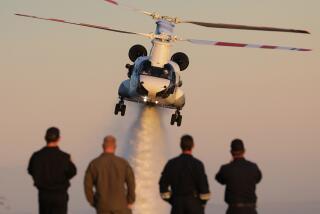Aerial Protection or Just High-Flying Harassment?
- Share via
IN THE 1983 movie “Blue Thunder” the major “character” was a military helicopter stuffed with an astonishing array of high-tech gadgets that seemed to make a mockery of the Fourth Amendment protection against unreasonable search. Closer to science fiction than common police practice, the film did make at least one cogent point: Law-enforcement helicopter patrols are one of the major civilian consumers of the military’s increasingly intrusive surveillance hardware.
The widely employed Forward Looking Infrared (FLIR), a heat-seeking device that creates images on a screen, effectively removes darkness without revealing a helicopter’s true intention. It won’t be long before police helicopters use laser target designators to track moving vehicles without a need for constant monitoring.
The potential abuse of such equipment must be considered. “Invasions of privacy concern me, as they should concern everyone,” states Capt. Robert Woods of LAPD’s Air Support Division. “But we receive relatively few complaints from citizens, and those all concern noise.”
Neighborhood organizations are typically supportive of airborne patrols. Lyn MacEwen Cohen, of the Miracle Mile Residential Assn., reports that in the last two years, since helicopters stepped up patrols in her area, crime has dropped 20%. Tony Hays, of the Wilshire Homeowners’ Alliance, says: “I feel positive about them; it’s one area where technology can be used against crime. Whatever protection we get is positive, and invasion of privacy is not a great concern.”
Such attitudes make ACLU criminal justice attorney Joan Howarth nervous. “Privacy rights are too precious to be lost in the name of technology,” she says. Given the choice between being safe and having certain rights, many people choose safety. But civil libertarians don’t feel that choice is necessary. We all want the best possible use of whatever technology is available,” says the attorney, whose organization has never seriously addressed the issue of routine patrols. “The rules of reasonable suspicion that street police must adhere to shouldn’t be suspended to accommodate helicopters. Shining lights on people standing around a car could be construed as analogous to stopping someone on the street in Beverly Hills just because he is black. Is it intrusive? Is it illegal? It’s important to know under what rules helicopters patrol, and what limits are imposed on them--how do they control their intrusion?”
Huntington Beach Aero Unit Sergeant Jeff King questions that attitude: “To protect one person’s right at the expense of the vast majority isn’t right. The other 188,000 Huntington Beach residents have a right to be secure.”
“I live next to MacArthur Park,” says Al Nodal, a member of the MacArthur Park Community Council seeking to reduce the drugs, prostitution and gambling that are epidemic in the park. “We have a love-hate relationship with the helicopters. They shine their lights and use their loudspeakers to disperse groups that hang around the park, but they are loud and they do scare people. They are helpful, but sometimes it feels like a police state.”
More to Read
Only good movies
Get the Indie Focus newsletter, Mark Olsen's weekly guide to the world of cinema.
You may occasionally receive promotional content from the Los Angeles Times.








